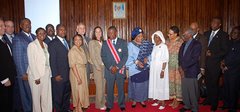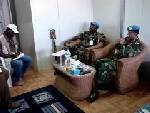
Following the news of the removal of the House of Representative Speaker, Edwin M. Snowe by his colleagues currently meeting at the Unity Conference Center in Virginia, outside the city, several Liberians are expressing fear on the issue.
Speaking to the GNN, the many Liberians, many of whom are from the public and private sectors and students of several Universities and Colleges said they were concerned about the constitutional provisions being applied by those lawmakers who sought the removal of their Speaker in the face of bribery charges leveled against them.
They also indicated that the failure of probing the alleged bribery case against them, it was worrisome for them to "quickly remove the Speaker who is the principle accuser without going through the case of bribery."
Speaking further, a law student of the University of Liberia, Thomas Tarr, told the GNN, "We are baffled of this situation; the credibility of our lawmakers must be questioned," he stressed.
For his part, the embattled Speaker says he is still Speaker of the Liberian Parliament, "This is a joke, I am still the Speaker, these guys are waisting their time," Mr. Snowe told a local radio station.
In a related development, the International Contact Group on Liberia has urged members of the House of Representatives to respect the due process of law.
The ICGL also urged the representatives to adhere to the rules of procedure of the House to resolve procedural and organizational matters. The ICGL’s statement comes after a group of representatives this week passed a vote of no confidence in House Speaker Edwin Snowe.
It wants the representatives resolve the matters because they are impeding the legislature’s ability to conduct the business for which its members were elected. The group said the allegation of bribery at the House is totally unacceptable and called for an independent investigation in accordance with international best practice. The ICGL comprises the United States, France, Morocco and Nigerian. Others are the United Kingdom, Ghana , the United Nations , ECOWAS and other international organizations, according to a press release issued today.








